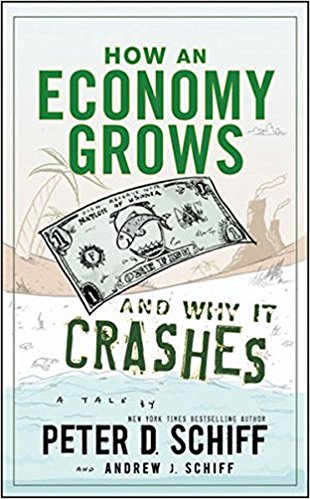Top Economics Books
11 min read ⌚
In 1849, the Scottish philosopher and historian Thomas Carlyle coined the phrase “the dismal science” to describe economics. His contemporary, John Stuart Mill, loudly contested Carlyle’s views, expressing his optimism that economics has the best shot of all human endeavors to actually make us better people.
And like it or hate it, the fact is that this social science regulates many aspects of your life. These 15 books went the furthest in analyzing which and how. These are really the best books on economics! And some of them profoundly altered our world.
#1. “An Inquiry into the Nature and Causes of the Wealth of Nations” by Adam Smith
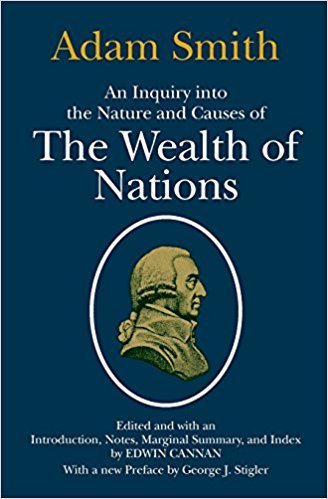 If you’ve ever been in Scotland or England, Adam Smith has probably been in your pocket quite a few times. Literally: he’s the guy on the Scottish £50 note and the most recent English £20 note!
If you’ve ever been in Scotland or England, Adam Smith has probably been in your pocket quite a few times. Literally: he’s the guy on the Scottish £50 note and the most recent English £20 note!
And the awesome thing he did to get there was writing “The Wealth of Nations,” his magnum opus, and the fundamental work in classical economics!
Published at the very dawn of the Industrial Revolution, and more than a decade before the Storming of the Bastille, the work (considered the first modern economics book!) is as fresh today as it was two and half centuries ago. In fact, its ideas about the free market, labor division, and the invisible hand still resonate loud with most of the economic theorists active today.
And did we mention: it is the second most cited book in social sciences published before 1950!
#2. “Capital: Critique of Political Economy” by Karl Marx
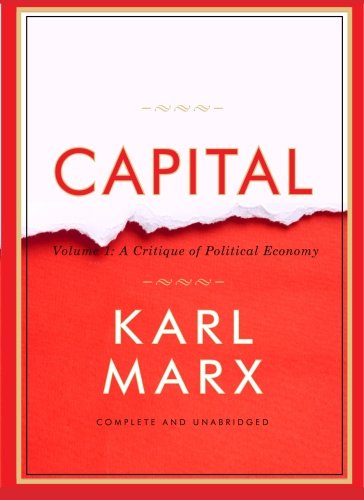 And that’s only because Karl Marx’s “Capital” is the most cited one!
And that’s only because Karl Marx’s “Capital” is the most cited one!
For a good reason, might we add. Because If Adam Smith can be credited as the founder of modern economy, “Das Kapital” set the foundations of materialist philosophy, economic history, and historical materialism.
For better or for worse, Marx wrote “The Communist Manifesto” as well – and that has somewhat tarnished the reputation of his most important work in the Western hemisphere. But, as the first sentence of this review proves, only among the general population.
Both political thinkers and leading economists think very differently. And they continually go back to Marx’s “Capital,” because the book – a mammoth three-volume study – is widely considered to be the best analysis of the historical origins of capitalism.
And because Marx’s theories about the surplus value and the inevitable fluctuations and economic crises in any capitalist society – wait for it – have been proven right. Over and over again.
#3. “Capitalism, Socialism, and Democracy” by Joseph A. Schumpeter
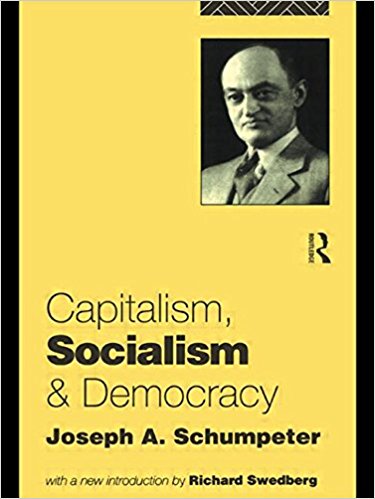 We already featured Joseph Schumpeter‘s influential 1942 volume in our list of the top 15 entrepreneurship books. But, we can’t leave it out of this list as well. The reasons are many. We’ll list only three.
We already featured Joseph Schumpeter‘s influential 1942 volume in our list of the top 15 entrepreneurship books. But, we can’t leave it out of this list as well. The reasons are many. We’ll list only three.
First of all, the only two social science books published before 1950 and cited more than this one, are the above two entries on this list.
Secondly, no list of most influential economists in history would be complete without the name Joseph Alois Schumpeter, the popularizer of concepts such as “creative destruction,” “entrepreneurship,” and “innovation.”
And finally, because it’s only natural after the foundational works of capitalism and socialism, that we include the one which best compares the theories.
Schumpeter’s final verdict in “Capitalism, Socialism, and Democracy”?
Somewhat unexpectedly, that capitalism will inevitably collapse. Not in the way Marx pictured it, though. But in a way which may be already happening.
#4. “John Maynard Keynes: 1883 – 1946: Economist, Philosopher, Statesman” by Robert Skidelsky
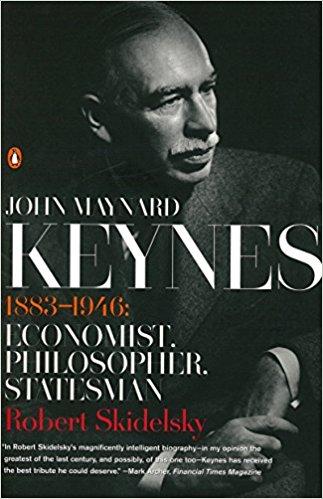 Adam Smith and Karl Marx are usually considered the most influential economists to have lived before the turmoil-driven 20th century. And few would disagree that John Maynard Keynes and Milton Friedman deserve the same accolades for the period ever since.
Adam Smith and Karl Marx are usually considered the most influential economists to have lived before the turmoil-driven 20th century. And few would disagree that John Maynard Keynes and Milton Friedman deserve the same accolades for the period ever since.
As the subtitle of Robert Skidelsky’s book tersely summarizes, John Maynard Keynes was a British economist, philosopher, and a statesman. And, possibly, the single most influential person of the 20th century.
And this book – available in three volumes, and in an abridged single-volume version – is widely considered to be the definite biography of his life and beliefs.
Its author, Robert Skidelsky, is a Russian-born Emeritus Professor of Political Economy at the University of Warwick, and just like Keynes himself, is a baron. Unfortunately, neither has won a Nobel Prize.
Keynes because he died in 1946 before his ideas became ubiquitous, and Skidelsky because – well, there’s no such thing as Nobel Prize for History. Otherwise, thinks Norman Stone, this biography would have easily got Skidelsky the award. It’s that good.
#5. “The General Theory of Employment, Interest, And Money” by John Maynard Keynes
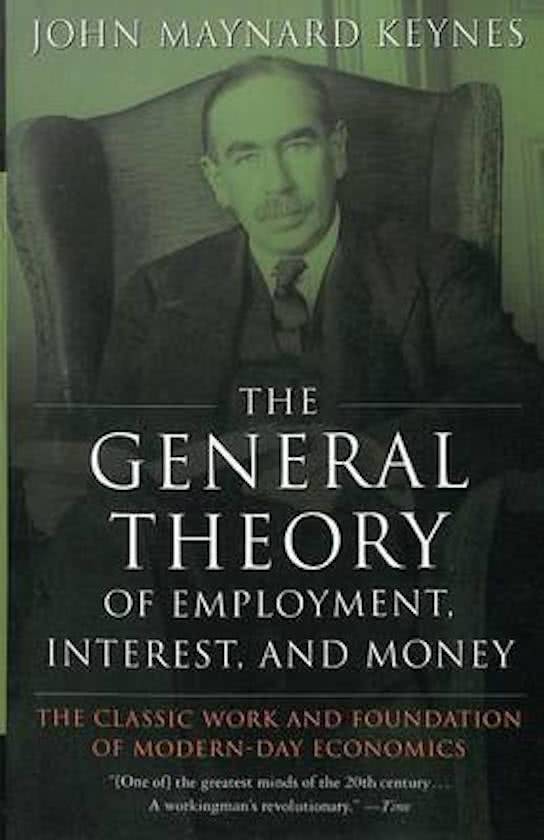 When “Time” magazine says that your ideas may have singlehandedly saved capitalism, your masterpiece is bound to be included in any list of the best economic books ever written.
When “Time” magazine says that your ideas may have singlehandedly saved capitalism, your masterpiece is bound to be included in any list of the best economic books ever written.
You see, as we said above, Schumpeter and Marx were fairly certain that capitalism will one day transform into something more akin to socialism.
And when the Great Depression began in the last months of 1929, many were certain that Marx’s predictions had come true. And that’s when the least talked-about revolution of the past century happened: the Keynesian revolution.
It was instigated by “The General Theory of Employment, Interest, and Money,” Keynes’ 1936 magnum opus and the foundational text of macroeconomics. One of its main ideas – that governments need to intervene in cases of free market crises and severe unemployment – was accepted by almost every capitalist state in the world in the two decades after Keynes’ death.
And just when you thought Keynesianism had fallen out of favor, the financial crisis of 2007-8 happened. And, once again, everybody was leafing through their notes on the margins of “The General Theory of Employment, Interest, and Money.”
#6. “Capitalism and Freedom” by Milton Friedman
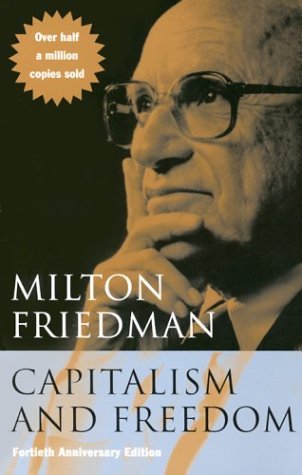 Wondering what caused the demise of Keynesianism?
Wondering what caused the demise of Keynesianism?
Well, it’s got a lot to do with one single person, the 1976 Nobel Prize winner, Milton Friedman. And his 1962 classic, “Capitalism and Freedom.”
Considered one of the most influential books written after the war, “Capitalism and Freedom” builds upon Friedman’s conviction that Keynesian economics is “a naïve” theory. And strives to find a better answer to the question how should the government help free trade and individual freedom.
The answer? By meddling as little as possible.
This premise (that political freedom follows economic freedom) is the fundamental in Friedman’s economic theory. However, “Capitalism and Freedom” also advocates measures such as GMI, negative income tax, and school vouchers – things largely ignored in discussions about his influence.
A close advisor to both Ronald Reagan and Margaret Thatcher, Milton Friedman has been repeatedly lauded by libertarian thinkers and criticized by left-wing intellectuals. Either way, he’s still as influential as ever.
#7. “Capital in the 21st Century” by Thomas Piketty
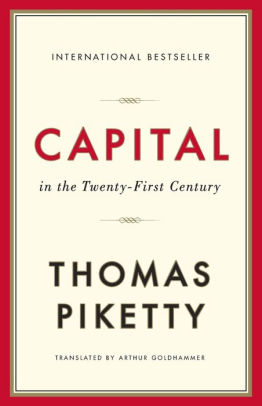 “Capital in the Twenty-First Century,” is one of the most recent books on this list. Published as “Le Capital au XXIe siècle” in 2013 (an obvious nod to Marx), its 2014 English translation made its author, Thomas Piketty, a fairly young French economist, a global superstar.
“Capital in the Twenty-First Century,” is one of the most recent books on this list. Published as “Le Capital au XXIe siècle” in 2013 (an obvious nod to Marx), its 2014 English translation made its author, Thomas Piketty, a fairly young French economist, a global superstar.
A simple fact may illustrate just how influential this book has been even in the short timespan: it’s the most sold book ever published by the Harvard University Press.
It’s a historical analysis, striving to understand better some economic relationships based on the data available about the past two centuries. And, at least in theory, it has successfully managed to revolutionize some common beliefs.
Because its main conclusion is that concentration of wealth stems from a long-term disbalance between the rate of return on capital and the rate of the economic growth – in favor of the former.
The solution?
The often criticized and dreaded progressive taxation. Piketty claims that, in fact, it’s our best tool to eliminate inequality.
#8. “Freakonomics: A Rogue Economist Explores the Hidden Side of Everything” by Steven D. Levitt and Stephen J. Dubner
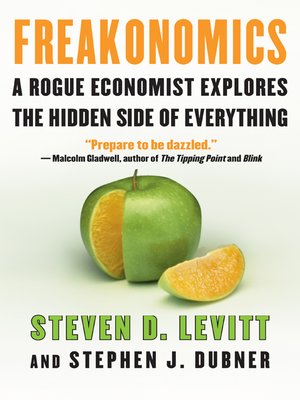 We can tell you one thing from the start: you won’t find a more eccentric economist than Steven D. Levitt or an acclaimed economics study stranger than “Freakonomics”! Co-written with “New York Times” journalist Stephen J. Dubner, the book started a collaboration which will propel both authors to stardom.
We can tell you one thing from the start: you won’t find a more eccentric economist than Steven D. Levitt or an acclaimed economics study stranger than “Freakonomics”! Co-written with “New York Times” journalist Stephen J. Dubner, the book started a collaboration which will propel both authors to stardom.
Levitt, a winner of the 2003 John Bates Medal for the most promising U.S. economist under 40, had already gained a reputation as an unconventional economist even before the publication of this book. But, “Freakonomics” was a freakish success: in 4 years, it sold over 4 million copies!
Mixing pop culture and serious economy, “Freakonomics” employs the utility maximization model to investigate instances of cheating in sumo wrestling, the role of legalized abortion in crime reduction, or the insignificant effects of good parenting on good education.
And if you like it – don’t worry: there are three sequels!
#9. “Thinking, Fast and Slow” by Daniel Kahneman
Daniel Kahneman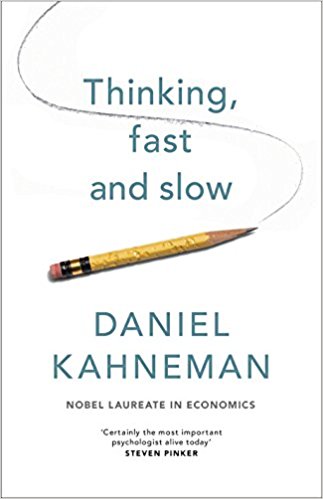 is not really an economist. Which is why we didn’t forget to include this book in our top 15 psychology book list.
is not really an economist. Which is why we didn’t forget to include this book in our top 15 psychology book list.
However, he has won the 2002 Nobel Memorial Prize in Economic Sciences. So, he definitely belongs in our current list as well.
“Thinking, Fast and Slow” summarizes Kahneman’s major ideas, in an accessible and introductory manner. Its central argument is that there are two different systems of thinking. The first one, “System 1,” employs emotions and is fast and instinctive, while the second one, “System 2.” is reasonable, slow and logical.
Both of them have been repeatedly shown to be biased. Then why, asks Kahneman, do we believe human judgment so much, when it’s fundamentally flawed?
And you can see how this relates to economic thought. In fact, it’s so revolutionary, that it has spawned a new era in economics – behavioral economics. Its main idea: that humans are just too unpredictable and complex to be explained away by macroeconomic theories.
Like this summary? We’d like to invite you to download our free 12 min app, for more amazing summaries and audiobooks.
#10. “The Affluent Society” by John Kenneth Galbraith
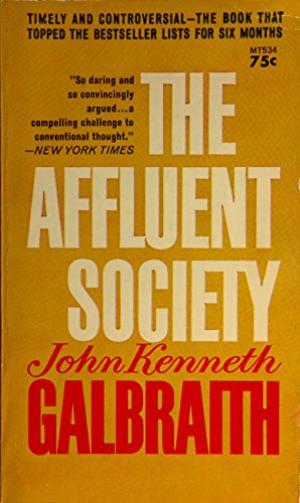 Have you ever used the phrase “conventional wisdom”? Even if you haven’t, we bet you know what it means. And it feels as old as time, right?
Have you ever used the phrase “conventional wisdom”? Even if you haven’t, we bet you know what it means. And it feels as old as time, right?
Wrong: it was invented in 1958 by John Kenneth Galbraith!
For most of his life, Galbraith was a much-admired public intellectual and a leading proponent of post-Keynesian economics and American liberalism after the war.
Published in 1958, “The Affluent Society” is the second part of his economics trilogy, which includes both “American Capitalism” (1952) and “The New Industrial State” (1967).
Hotly debated and frighteningly divisive, the book strives to understand the origins of economic inequity. Galbraith points his finger at the obsolete economic traditions, in the vein of Adam Smith, which – he believes – are not suited for affluent societies such as the post-war American.
His way out?
Moving from private production economy to a public investment economy, while eradicating poverty, and improving the quality of public schools. All it takes is just moving some money from the private to the public sector.
#11. “The Road to Serfdom” by Friedrich von Hayek
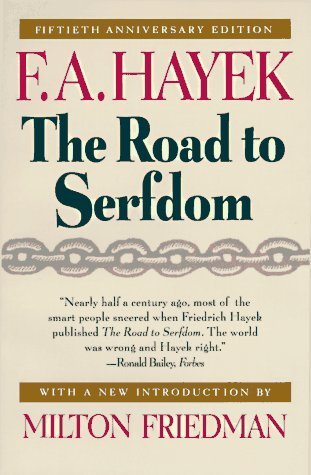 Friedrich Hayek is another Nobel Prize winner on our list. A staunch defender of classical liberalism, he’s also the third, after Keynes and his biographer Skidelsky, with an FBA award.
Friedrich Hayek is another Nobel Prize winner on our list. A staunch defender of classical liberalism, he’s also the third, after Keynes and his biographer Skidelsky, with an FBA award.
Written during the Second World War, “The Road to Serfdom” is Hayek’s most famous book. It shows beautifully both his economic expertise and his political interests and knowledge.
The basic idea is Hayek’s then-innovative belief that political freedom is not possible in societies where the government has economic control. And, in his opinion, this phrase describes all non-capitalistic societies, whether fascism, national socialism or communism.
Unlike most of his contemporaries, Hayek thought that these three systems of thought are fundamentally the same. And that their basic flaw is favoring the state over the individual.
Milton Friedman has compared this book’s importance to Adam Smith’s “The Wealth of Nations.” So, you can see why we had to include it in our list.
#12. “Human Action: A Treatise on Economy” by Ludwig von Mises
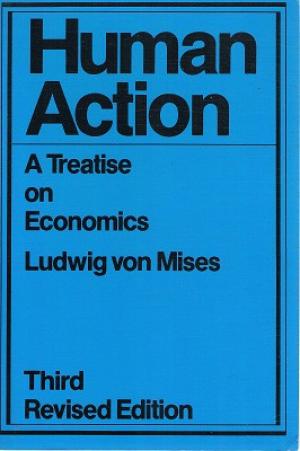 Friedrich Hayek frequently said that he owes much of what he has become to his teacher.
Friedrich Hayek frequently said that he owes much of what he has become to his teacher.
His name?
Ludwig von Mises, an Austrian-born American émigré who was probably the most important figure in the post-war liberalist revival.
“Human Action” is a gargantuan thousand-page treatise on economy, in which Mises expounds most thoroughly the ideas he came to be known for. Much like Hayek and Friedman after him, Mises believes that free trade is not only a sound basis for an economic system, but also for civilization itself.
Mises’ defense of laissez-faire capitalism is founded on his investigations in praxeology, i.e., the deductive study of human action. In fact, that’s where the title comes from. However, with the advent of behavioral economics, spearheaded by figures such as Daniel Kahneman and Amos Tversky, praxeology has grown out of favor.
Interestingly enough, Mises has not.
#13. “The Moral Consequences of Economic Growth” by Benjamin M. Friedman
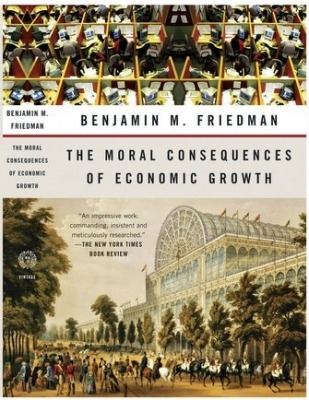 No, Benjamin M. Friedman is in no way related to Milton Friedman. Ironically, the former Friedman made his name critiquing the policies of the latter one. Even if not straightforwardly: Benjamin Friedman’s “Day of Reckoning” ripped Ronald Reagan’s economic policies to pieces.
No, Benjamin M. Friedman is in no way related to Milton Friedman. Ironically, the former Friedman made his name critiquing the policies of the latter one. Even if not straightforwardly: Benjamin Friedman’s “Day of Reckoning” ripped Ronald Reagan’s economic policies to pieces.
And – you remember – Milton Friedman was Reagan’s economic advisor.
In “The Moral Consequences of Economic Growth,” Benjamin M. Friedman once again tackles few problems which transcend economy per se. The central question: whether we should care about economic growth as much as we do?
The simple answer: yes, we should! Because in periods of stagnation – Benjamin Friedman shows – the first thing that happens is the decline of democracy and tolerance.
In other words, we’re not striving for good economic results because of the money. We’re doing that because it helps us be somewhat better to each other.
#14. “Aftershock: The Next Economy and America’s Future” by Robert B. Reich
Robert B. Reich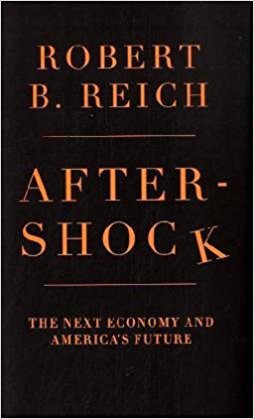 has served in the administrations of three U.S. presidents, Gerald Ford, Jimmy Carter, and Bill Clinton. And he acted as the Secretary of Labor between 1993 and 1997.
has served in the administrations of three U.S. presidents, Gerald Ford, Jimmy Carter, and Bill Clinton. And he acted as the Secretary of Labor between 1993 and 1997.
So, when he talks about the financial crisis of 2008, it’s wise to expect him to have some smart things to say.
The principal thesis of “Aftershock” is that if American governments don’t show some interest for the middle class, crises like this one are bound to reoccur. Just like Piketty and Galbraith, Reich examines the reasons behind America’s inequality and concludes that politicians ignored it for too long and that the blood of recession is on their hands.
How can we stop it from happening once again?
With a new deal between the government and the people. Its highlights: a reverse income tax, higher marginal tax rates based on a person’s earnings, school vouchers, carbon taxes, and a universal healthcare plan.
#15. “How an Economy Grows and Why It Crashes” by Peter Schiff
Peter Schiff is the son of Irwin Schiff, possibly the most famous tax protester in modern U.S. history. Irwin Schiff believed that income tax was illegal and sued the government. After few courts ruled against him, he was convicted to a 13-year prison sentence.
He recently died in prison, but not before inspiring many followers.
And – you know what they say – like father, like son. Or sons.
So, unsurprisingly, Peter Schiff is a strong supporter of the Austrian school of economic thought, i.e., economists in the vein of Hayek and Mises. And in “How an Economy Grows and Why It Crashes” he teams up with his brother Andrew to finish both theirs and his father’s mission.
Namely, to show where Keynesians erred and where their father and the Austrians were right. And he uses a simple analogy (about a fishing island nation) – and an even simpler language – to explain complex economic ideas.
And that’s the best part!
It doesn’t really matter if you agree with the Schiffs or not. You’ll learn the basics of economy, nevertheless.
Emir is the Head of Marketing at 12min. In his spare time, he loves to meditate and play soccer.



